|
|
|
Sort Order |
|
|
|
Items / Page
|
|
|
|
|
|
|
| Srl | Item |
| 1 |
ID:
163369
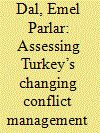

|
|
|
|
|
| Summary/Abstract |
This paper aims to shed light on Turkey’s conflict management role after the Cold War using a three-layered framework consisting of the layers of actorness, approaches and tools. In doing so, it seeks to profile Turkey’s international conflict management since the Cold War years with a special focus on the nature of its participation in conflict management as an active or passive actor, the perspectives from which it approaches conflict management, and the conflict management instruments it utilises. First, the paper will provide a conceptual framework of international conflict management based on the above-mentioned triad of actorness, approaches and tools as derived from the existing literature. Second, it will apply the selected three-layered analytical framework to Turkey to decipher its strengths and limitations in managing international conflicts.
|
|
|
|
|
|
|
|
|
|
|
|
|
|
|
|
| 2 |
ID:
140414
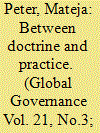

|
|
|
|
|
| Summary/Abstract |
Mandates of recent peacekeeping operations across Africa have shown substantial innovation in the thinking of the UN Security Council. Offensive use of force, use of unmanned aerial vehicles, strategic intelligence and communication, and state-building mandates in the midst of conflicts have all expanded the scope of activities beyond what the UN peacekeepers are accustomed to. The UN is entering a new era of enforcement peacekeeping. Enforcement peacekeeping manifests itself both in enforcement of political solutions through support of a government's state-building ambitions and its attempts to extend state authority in the midst of conflict and in enforcement of military victories through the offensive use of force. These developments further unsettle the basic principles of UN peacekeeping—consent, impartiality, and nonuse of force—resulting in a schism between the doctrine and practice. This contribution argues that such fundamental challenges, when not properly acknowledged, create a wall between operational activities and strategic considerations. They preclude a proper debate on the problematic externalities, in particular on political processes and peacebuilding.
|
|
|
|
|
|
|
|
|
|
|
|
|
|
|
|
| 3 |
ID:
104599
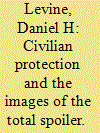

|
|
|
| 4 |
ID:
169244
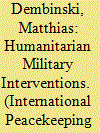

|
|
|
|
|
| Summary/Abstract |
The article offers a much-needed impulse to the debate on humanitarian military interventions, which is characterized by conceptual confusion and a lack of comparative research. Based on a comprehensive review of the literature, we identify the most important definitional controversies and discuss the conceptual pros and cons of the respective positions. We illustrate how definitional choices affect comparative research using a new dataset covering all humanitarian military interventions since the Second World War. Classic definitions based on ideal types might have normative merits, but they cannot ground an empirical research programme because they vacate the universe of cases. However, military interventions for declared humanitarian purposes are here to stay, and they should be analysed instead of defined into oblivion. Thus, the definition should reflect the practice of humanitarian military interventions, not subordinate the humanitarian purpose to violations of sovereignty and international law. The definition must not be restricted to interventions reacting to death tolls that ‘shock the conscience of mankind’; it must also consider interventions in the early stages of conflict. Moreover, military interventions should not be disregarded when the humanitarian motive is not exclusive or predominant.
|
|
|
|
|
|
|
|
|
|
|
|
|
|
|
|
| 5 |
ID:
146003


|
|
|
|
|
| Summary/Abstract |
The main significance and novelty of the Intervention Brigade established by the United Nations (UN) Security Council in March 2013 in the Democratic Republic of the Congo have previously been attributed to its robust mandate, enhanced capacities and offensive concept of operations. At the tactical, strategic and doctrinal levels of analysis, the Brigade could be considered a continuum of the robust and technological turn of UN peacekeeping, which has continued for more than a decade and is reinvigorated in the so-called new generation of peacekeeping tactics outlined in the New Horizon document. However, this article argues that the most profound significance and novelty of the Brigade reside at the underlying paradigmatic level, which has been ignored in the previous literature. The Brigade embodies not only robust capacities and mandate (peacekeeping with muscles) but also a new peacekeeping paradigm, namely, sovereignty-building (peacekeeping for body politic). The sovereignty-building paradigm is aimed at creating or strengthening the positive and negative sovereignty of the host government. The Brigade reinforces the positive sovereignty of the Congolese government by boosting its self-directive domestic and foreign policy, political will, ownership and responsibility vis-à-vis its regional peers, for example, by making its exit strategy conditional on the Congolese own Rapid Reaction Force. With regard to negative sovereignty, the Brigade contributes to the reinstatement of territorial integrity and supreme state authority by neutralising militia groups.
|
|
|
|
|
|
|
|
|
|
|
|
|
|
|
|
| 6 |
ID:
061936
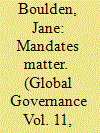

|
|
|
|
|
| Publication |
Apr-Jun 2005.
|
|
|
|
|
|
|
|
|
|
|
|
|
|
|
|
| 7 |
ID:
159849


|
|
|
|
|
| Summary/Abstract |
Based on primary and secondary sources, this article analyzes the policy of the Mulroney government on humanitarian intervention in the former Yugoslavia between 1991 and 1993. It finds that the Mulroney government chose to play a leading role in the international intervention in the former Yugoslavia, because doing so both allowed the government to implement its vision of a post-Cold War world order that aligned with its understanding of Canadian interests, and satisfied the demands and preferences of the Canadian public. At the same time, the Mulroney government stumbled into unanticipated situations in Yugoslavia, and failed to respond to them effectively. This led the government to reconsider the assumptions that had motivated its initial enthusiasm for intervention, and to commence a review of peacekeeping and intervention that it would not live to implement.
|
|
|
|
|
|
|
|
|
|
|
|
|
|
|
|
| 8 |
ID:
152382
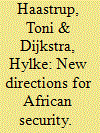

|
|
|
|
|
| Summary/Abstract |
African security, particularly conflict-related political violence, is a key concern in international relations. This forum seeks to advance existing research agendas by addressing four key themes: domestic politics and peacekeeping; security sector reform programs; peace enforcement; and the protection of civilians. Each of the articles in this forum makes a case for analyzing African agency when it comes to African security. As a way of introduction, this short article sets out the main debates and concludes by providing further directions for future research.
|
|
|
|
|
|
|
|
|
|
|
|
|
|
|
|
| 9 |
ID:
152385
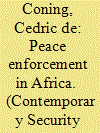

|
|
|
|
|
| Summary/Abstract |
When the United Nations (UN) Security Council needs to authorize a peace enforcement operation in Africa, its partner of choice is the African Union (AU). Africa has developed significant peace operations capacity over the past decade. In addition to deploying eight AU operations, Africa now contributes 50% of all UN peacekeepers. African stability operations, like its mission in Somalia, are often described as peace enforcement operations. In this article, I question whether it is accurate to categorize African stability operations as peace enforcement? I answer the question by considering what the criteria are that are used to differentiate between peace enforcement and peacekeeping operations in the UN context. I then use the peace enforcement criteria to assess whether AU stabilization operations would qualify as peace enforcement operations. In conclusion, I consider the implications of the findings for the strategic partnership between the AU and the UN.
|
|
|
|
|
|
|
|
|
|
|
|
|
|
|
|
| 10 |
ID:
097652


|
|
|
|
|
| Publication |
2009.
|
| Summary/Abstract |
This article outlines the potential benefits of establishing a UN Emergency Peace Service (UNEPS). It argues that a UNEPS could have helped overcome some of the practical and political obstacles faced by the UN Assistance Mission in Rwanda (1993-1994), the AU Mission in Sudan and UN support packages in Darfur (2006-2008).
|
|
|
|
|
|
|
|
|
|
|
|
|
|
|
|
| 11 |
ID:
171207


|
|
|
|
|
| Summary/Abstract |
The conventional wisdom about the 1992 US intervention in Somalia is that it was a quintessentially humanitarian mission pushed by President George H. W. Bush. This article challenges that interpretation, drawing on newly declassified documents. The Somalia intervention, I argue, was largely a pragmatic response to concerns held by the US military. In late 1992, as the small UN mission in Somalia was collapsing, senior American generals worried about being drawn into the resulting vacuum. Hence they reluctantly recommended a robust US intervention, in the expectation that this would allow the UN to assemble a larger peacekeeping force that would take over within months. The intervention ultimately failed, but the military learned useful lessons from this experience on how to achieve smoother UN handoffs in the future and thus effectively shift longer-term stabilisation burdens to the international community.
|
|
|
|
|
|
|
|
|
|
|
|
|
|
|
|
|
|
|
|
|